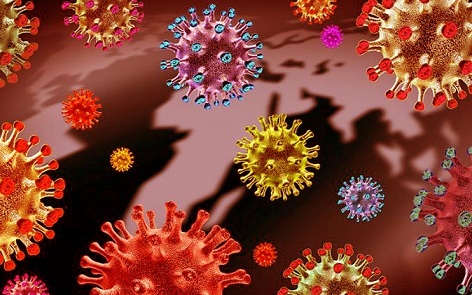Study warns that new COVID-19 subvariants LB.1, KP.2.3, KP.3, and KP.3.1.1. with Del S31 mutation challenge vaccines
Nikhil Prasad Fact checked by:Thailand Medical News Team Sep 08, 2024 1 year, 3 months, 2 weeks, 1 day, 23 hours, 30 minutes ago
Medical News: As the global pandemic continues to evolve, scientists have been closely monitoring new variants of the SARS-CoV-2 virus. Recently, a study conducted by researchers from American institutions including The Ohio State University, University of Texas Health Science Center at Houston, and others, has brought to light important findings about the new COVID-19 subvariants derived from the JN.1 strain. This
Medical News report explains the critical aspects of these subvariants in a way that is easy to understand for anyone, without requiring a medical background.
 Study warns that new COVID-19 subvariants LB.1, KP.2.3, KP.3, and KP.3.1.1. with
Study warns that new COVID-19 subvariants LB.1, KP.2.3, KP.3, and KP.3.1.1. with
Del S31 mutation challenge vaccines
Rising Concerns: New Subvariants Emerge
COVID-19 cases surged globally in 2024, driven by subvariants of the JN.1 strain of SARS-CoV-2. The study focused on several specific subvariants: LB.1, KP.2.3, KP.3, and KP.3.1.1. These variants were found to be particularly concerning due to their ability to evade neutralizing antibodies, the proteins in our immune system designed to protect us from the virus.
The study sheds light on how these subvariants have developed unique features, making them harder for the immune system to recognize and fight off. These variants carry a mutation, referred to as Del S31, located in the spike protein’s N-terminal domain (NTD). This mutation is primarily responsible for the variants' ability to escape the immune system.
The Role of the Spike Protein
The spike protein of the SARS-CoV-2 virus is crucial because it allows the virus to enter human cells. The study focused on how mutations in the spike protein have allowed the virus to become more stable and evade immune responses more effectively.
One of the main findings of the study was that the Del S31 mutation changes the way the spike protein behaves. The mutation causes a shift in how the spike protein interacts with cells and antibodies. Specifically, the change stabilizes the spike protein, making it harder for neutralizing antibodies (nAbs) to recognize and bind to the virus.
Impact on Vaccine Efficacy
The study tested the ability of neutralizing antibodies from healthcare workers who had received the bivalent mRNA vaccine to block the virus. Unfortunately, the new subvariants showed a marked reduction in antibody neutralization. This reduction was observed in people vaccinated with both the earlier versions of the COVID-19 vaccines and those who received the newer, updated vaccines designed for the Omicron variants.
One critical discovery was that the Del S31 mutation dramatically reduced the effectiveness of antibodies produced by the vaccine. The subvariants with the Del S31 mutation showed up to a 9.3-fold decrease in neutralizing antibody levels, meaning that people vaccinated with the bivalent vaccine might not be as well protected against these newer subvariants.
Resistance to Monoclonal An
tibodies
Monoclonal antibodies, lab-made proteins that mimic the immune system's ability to fight off harmful pathogens, have been an essential tool in treating COVID-19. However, the study found that all newly emerged JN.1 subvariants, including LB.1, KP.2.3, and KP.3.1.1, were resistant to S309, one of the broadest neutralizing monoclonal antibodies.
This resistance poses a significant challenge to current treatment options, making it more difficult to combat severe cases of COVID-19 caused by these variants.
Infectivity of the New Subvariants
The study also looked at how infectious these new subvariants were compared to earlier versions of the virus. In laboratory tests using human cells, subvariants like KP.3 and KP.3.1.1 showed increased infectivity, meaning they could spread more easily. Interestingly, the DelS31 mutation played a role in this increased infectivity, particularly in lung cells, which are the primary targets of the virus.
However, despite their increased infectivity, the subvariants were less effective at fusing with human cells compared to earlier variants. This fusion process is an essential step in how the virus spreads from one cell to another within the body.
Spike Protein Stability
Another critical finding was that the DelcS31 mutation made the spike protein more stable at higher temperatures, which could potentially allow the virus to survive longer in different environments. The researchers found that viruses with the DelcS31 mutation, such as KP.3.1.1, were more resistant to being inactivated by heat. This stability might give the virus an evolutionary advantage, allowing it to spread more effectively in warmer climates or survive on surfaces longer.
The Importance of Developing New Vaccines
The study highlights the need to update COVID-19 vaccines to include antigens containing the Del S31 mutation. As these subvariants continue to evolve, it becomes increasingly important for vaccines to keep pace with the changes in the virus. Without these updates, the effectiveness of current vaccines may continue to decline, leaving populations vulnerable to new waves of infection.
Researchers also emphasized that monitoring the virus’s evolution remains critical for controlling the pandemic. Understanding how mutations like Del S31 affect viral behavior will guide the development of better vaccines and treatments in the future.
Conclusion
In summary, this study provides important insights into the ongoing evolution of the SARS-CoV-2 virus. The JN.1-derived subvariants LB.1, KP.2.3, KP.3, and KP.3.1.1 have shown significant immune evasion, particularly due to the Del S31 mutation. These variants are resistant to neutralizing antibodies from both vaccines and monoclonal antibodies, and they display increased stability and infectivity.
The study highlights the urgent need for updated vaccines and new treatments to address these rapidly evolving variants. As the pandemic continues, ongoing research and surveillance will be essential to staying ahead of the virus and protecting public health.
The study findings were published on a preprint server and is currently being peer reviewed.
https://www.biorxiv.org/content/10.1101/2024.09.04.611219v1
For the latest COVID-19 News, keep on logging to Thailand
Medical News.
Read Also:
https://www.thailandmedical.news/news/columbia-study-reveals-alarming-resistance-of-kp-3-1-1-variant-to-america-s-last-monoclonal-antibody-defense
https://www.thailandmedical.news/news/the-sars-cov-2-variants-that-could-drive-the-fall-winter-wave-xec-xed-mb-1-1-mw-1-and-xdv-1-1
